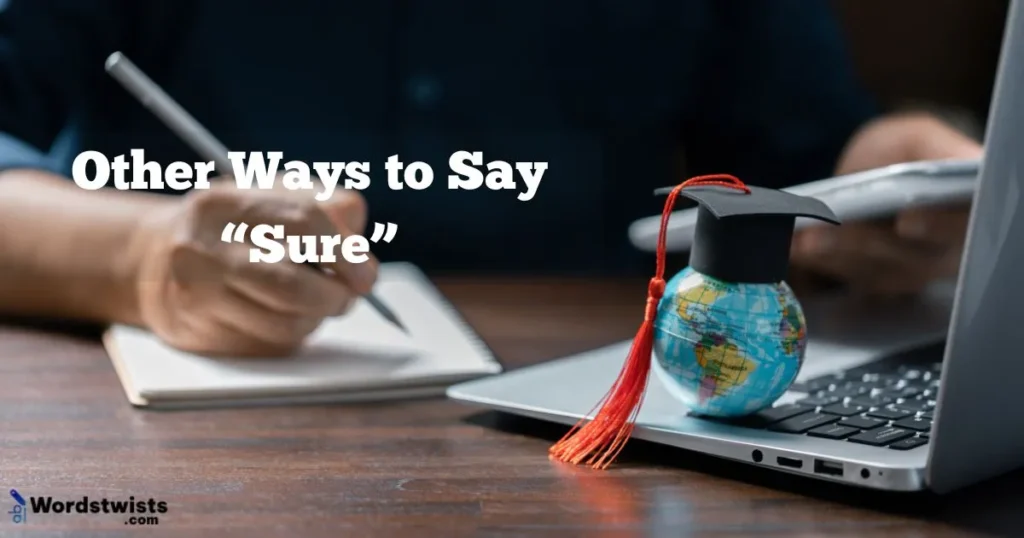We all know how easy it is to get stuck using the word “sure” over and over again. Whether you’re chatting with friends, writing emails at work, or giving a quick reply on social media platforms like WhatsApp or Slack, it feels like “sure” is just the go-to word—safe but a little dull. But what if you want your words to sound more interesting? What if you want to express certainty, agreement, or willingness with a bit more personality and flair?
That’s exactly why expanding your vocabulary with other ways to say sure can make a big difference in both your spoken language and written communication. Using fresh and creative alternatives will not only help your conversations and professional emails sound more natural and confident but also make your compliments, agreements, and responses stand out with style. Imagine telling your colleagues, clients, or even your family members something that sounds more precise and heartfelt—whether it’s in a casual chat at your favorite coffee shop or during a formal meeting in a conference room.
You’ll connect better, sound smarter, and feel more confident in your communication—whether you’re in New York, London, or any other bustling city where clear, engaging communication is key. Ready to upgrade your vocabulary? Dive into this list of 25 compelling synonyms and phrases for “sure,” each explained with clear examples and tips on when to use them. Let’s make your words sparkle and your messages unforgettable!
Synonyms for “Sure”
1. Absolutely
Explanation:
“Absolutely” is a strong, confident way to say yes or agree. It shows full certainty and often adds enthusiasm. It’s perfect when you want to sound sure and positive.
Examples:
- Are you coming to the party? Absolutely!
- I absolutely agree with your idea.
- Can you help me with this task? Absolutely, no problem.
- She absolutely loved the gift.
- We are absolutely ready for the meeting.
Why it works:
“Absolutely” adds energy and certainty. It feels genuine and strong, making your agreement or confirmation stand out.
2. Certainly
Explanation:
“Certainly” is polite and professional. It shows clear agreement and is often used in formal or respectful settings.
Examples:
- Could you send me the report? Certainly.
- I will certainly attend the conference.
- The instructions are certainly easy to follow.
- We certainly appreciate your feedback.
- Yes, certainly, I can assist you with that.
Why it works:
“Certainly” sounds respectful and clear. It’s perfect when you want to be polite but still confident.
3. Definitely
Explanation:
“Definitely” expresses strong certainty and assurance. It’s casual but confident, used often in everyday conversation.
Examples:
- Are you free tomorrow? Definitely!
- This is definitely the best choice.
- I definitely want to try that restaurant.
- She definitely deserves the award.
- We will definitely finish on time.
Why it works:
“Definitely” is casual yet powerful, helping your speech sound natural and firm.
4. Of Course
Explanation:
“Of course” suggests something is natural or expected. It’s friendly and often used to show willingness.
Examples:
- Can I borrow your book? Of course!
- Of course, I’ll help you move.
- That’s of course the right answer.
- You can of course count on me.
- Of course, I’d love to join you.
Why it works:
“Of course” feels warm and inviting, perfect for showing friendly agreement.
5. Without a Doubt
Explanation:
This phrase emphasizes total certainty, removing any hesitation.
Examples:
- She is without a doubt the best candidate.
- Without a doubt, this is a great opportunity.
- I can say without a doubt that we’ll succeed.
- This recipe works without a doubt every time.
- Without a doubt, he is an expert in his field.
Why it works:
It’s a clear, strong way to express complete confidence.
6. For Sure
Explanation:
“For sure” is a casual, friendly way to say yes. It shows confidence and agreement, often used in everyday conversations.
Examples:
- Are you coming to the game? For sure!
- I’ll be there for sure.
- That movie was amazing, for sure.
- You can count on me for sure.
- We’ll finish the project on time, for sure.
Why it works:
It sounds relaxed and genuine, making your agreement feel easygoing and natural.
7. Affirmative
Explanation:
“Affirmative” is a formal or technical way to say yes, often used in military, aviation, or official contexts. It shows clear agreement.
Examples:
- Mission confirmed, affirmative.
- Affirmative, the package has been delivered.
- Your request is affirmative.
- Affirmative, I will comply with the order.
- We received your message—affirmative.
Why it works:
It adds precision and formality, perfect when you want to sound official and clear.
8. Naturally
Explanation:
“Naturally” expresses agreement as something expected or obvious. It carries a friendly, confident tone.
Examples:
- Naturally, I’ll support your decision.
- She naturally agrees with the plan.
- Naturally, we’ll help you move.
- Of course, naturally, you can join us.
- The results naturally show improvement.
Why it works:
It sounds smooth and warm, making your agreement feel intuitive and sincere.
9. Undoubtedly
Explanation:
“Undoubtedly” shows strong certainty with no hesitation. It sounds formal and confident.
Examples:
- She is undoubtedly the best choice.
- The evidence is undoubtedly clear.
- Undoubtedly, we will reach our goals.
- This is undoubtedly a major breakthrough.
- His skills are undoubtedly impressive.
Why it works:
It emphasizes certainty and leaves no room for doubt, great for serious or formal communication.
10. Positively
Explanation:
“Positively” expresses agreement with a bright and confident tone. It can also add a bit of cheerfulness.
Examples:
- I’m positively sure about this decision.
- She positively agreed to the proposal.
- We positively recommend this product.
- He was positively thrilled with the results.
- Positively, I’ll be there on time.
Why it works:
It adds a positive vibe to your certainty, making your agreement sound enthusiastic and sure.
11. Surely
Explanation:
“Surely” is a polite and somewhat formal way to express certainty or expectation.
Examples:
- Surely, you will understand my point.
- He will surely arrive on time.
- Surely, this is the right answer.
- You surely can rely on us.
- This will surely make a difference.
Why it works:
It sounds thoughtful and respectful, good for polite or formal contexts.
12. By All Means
Explanation:
“By all means” is an encouraging way to agree, inviting someone to proceed or confirming willingness.
Examples:
- Can I borrow your notes? By all means!
- By all means, take your time.
- If you want to join, by all means.
- By all means, ask any questions you have.
- We can by all means start the project now.
Why it works:
It’s warm and supportive, perfect for showing open and positive agreement.
13. You Bet
Explanation:
“You bet” is a casual, upbeat way to say yes. It shows excitement and readiness.
Examples:
- Want to go out tonight? You bet!
- You bet I’ll help you.
- This plan will work, you bet.
- You bet, I’m ready for the challenge.
- You bet, we’ll meet the deadline.
Why it works:
It’s friendly and confident, making your eyes sound energetic and informal.
14. Indeed
Explanation:
“Indeed” confirms agreement or truth, often adding emphasis and formality.
Examples:
- Indeed, that is the correct answer.
- She is indeed very talented.
- Indeed, we must act quickly.
- The results were indeed impressive.
- He did indeed complete the task.
Why it works:
It adds a thoughtful and strong confirmation, fitting for serious or formal statements.
15. Assuredly
Explanation:
“Assuredly” means with full confidence and certainty, often used in formal writing or speech.
Examples:
- We are assuredly on the right path.
- He assuredly accepted the offer.
- Assuredly, the project will succeed.
- The evidence assuredly supports the claim.
- Assuredly, this is the best choice.
Why it works:
It sounds strong and formal, perfect for confident declarations.
16. Gladly
Explanation:
“Gladly” shows willingness with a friendly, positive tone.
Examples:
- I’ll gladly help you move.
- She gladly accepted the invitation.
- Gladly, I’ll join you for lunch.
- We gladly support your cause.
- He gladly offered his assistance.
Why it works:
It adds warmth and enthusiasm to your agreement or acceptance.
17. Totally
Explanation:
“Totally” is a casual and energetic way to say yes or agree completely.
Examples:
- Are you coming? Totally!
- I totally agree with your point.
- That’s totally fine with me.
- She totally loved the surprise.
- We totally support your idea.
Why it works:
It’s informal and expressive, great for relaxed, friendly conversations.
Other Ways to Say “I Understand”
18. Unquestionably
Explanation:
“Unquestionably” shows absolute certainty without doubt.
Examples:
- He is unquestionably the best player.
- Unquestionably, this is a success.
- The facts unquestionably prove it.
- Unquestionably, we will achieve the goal.
- This method is unquestionably effective.
Why it works:
It conveys strong, formal confidence, making your point undeniable.
19. Without Question
Explanation:
“Without question” means with complete certainty and no doubt.
Examples:
- She is without question the leader.
- The plan will work without question.
- Without question, this is the best approach.
- We trust him without question.
- The results came without question.
Why it works:
It emphasizes total confidence, great for convincing statements.
20. Beyond Doubt
Explanation:
“Beyond doubt” means absolutely certain, leaving no room for skepticism.
Examples:
- The truth is beyond doubt.
- Beyond doubt, this is the right decision.
- His innocence is beyond doubt.
- The evidence stands beyond doubt.
- Beyond doubt, this was a success.
Why it works:
It’s powerful and formal, perfect for strong affirmations.
Other Ways to Say “In Terms of”
21. Right On
Explanation:
“Right on” is a casual, enthusiastic way to agree or confirm.
Examples:
- Want to join us? Right on!
- Right on, I’ll be there.
- That’s right on with the plan.
- You’re right on target.
- Right on, let’s get started.
Why it works:
It sounds energetic and friendly, great for informal conversations.
22. Affirmed
Explanation:
“Affirmed” means confirmed or agreed to, often in formal or official contexts.
Examples:
- Your request has been affirmed.
- The decision was affirmed by the board.
- I affirmed my attendance.
- The policy was affirmed last week.
- Affirmed, we will proceed as planned.
Why it works:
It’s precise and formal, useful in official confirmations.
23. Easily
Explanation:
“Easily” can express agreement with the sense that something is simple or no problem.
Examples:
- I can easily help you with that.
- She easily agreed to the proposal.
- We will easily meet the deadline.
- He easily solved the problem.
- You can easily count on us.
Why it works:
It adds a sense of effortlessness and confidence to your agreement.
24. Clearly
Explanation:
“Clearly” expresses agreement or certainty in an obvious or unmistakable way.
Examples:
- Clearly, this is the best choice.
- He clearly supports the idea.
- The facts clearly show the outcome.
- We clearly understand your concerns.
- Clearly, the plan will succeed.
Why it works:
It emphasizes clarity and confidence in your statement.
25. No Problem
Explanation:
“No problem” is a casual, friendly way to say yes or show willingness, implying ease.
Examples:
- Can you help me? No problem!
- No problem, I’ll do it right away.
- That’s no problem at all.
- Do you need assistance? No problem.
- We can fix that—no problem.
Why it works:
It sounds approachable and easygoing, perfect for informal conversations.
Conclusion
Expanding your vocabulary with these alternatives to “sure” will make your conversations and writing livelier and more expressive. Whether you want to sound formal, casual, friendly, or confident, this list has the perfect option for you. Try using these words in your daily life and watch how your communication becomes clearer, more engaging, and full of personality!
Ready to practice? Pick a few of these synonyms and start using them today to add style and strength to your words. Your listeners and readers will notice the difference and so will you!

I’m Leo Knox, the wordplay wizard behind WordsTwists.com where I turn everyday meanings into funny, clever, and creative twists. If you’re tired of saying things the boring way, I’ve got a better (and funnier) one for you!


